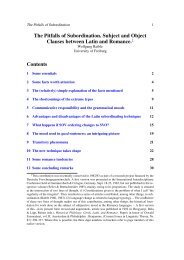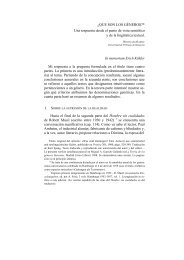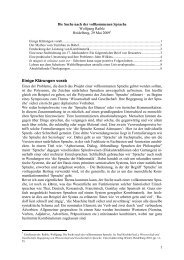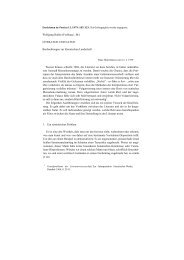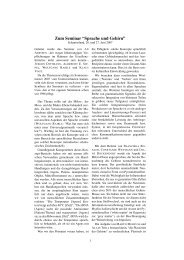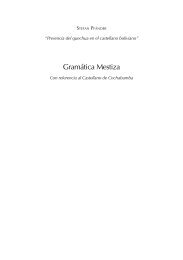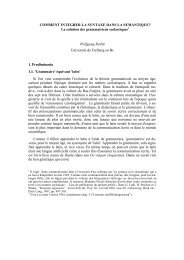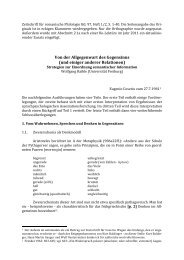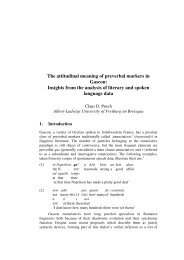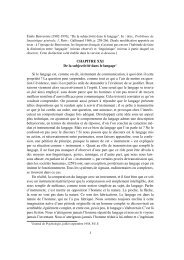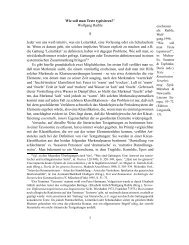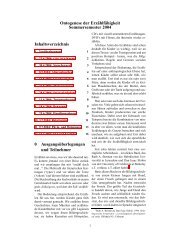A Summary of Role and Reference Grammar
A Summary of Role and Reference Grammar
A Summary of Role and Reference Grammar
Create successful ePaper yourself
Turn your PDF publications into a flip-book with our unique Google optimized e-Paper software.
Semantic structure Semantics plays a central role in <strong>Role</strong> <strong>and</strong> <strong>Reference</strong> <strong>Grammar</strong> [RRG], <strong>and</strong><br />
the aspects <strong>of</strong> semantics in RRG to be addressed herein are: (1) the lexical representation <strong>of</strong><br />
verbs <strong>and</strong> other predicating elements, (2) semantic roles, (3) the role <strong>of</strong> the lexicon in grammar,<br />
<strong>and</strong> (4) interclausal semantic relations..<br />
The lexical representation <strong>of</strong> verbs<br />
The heart <strong>of</strong> the RRG approach to lexical representation is a system <strong>of</strong> lexical decomposition<br />
based on Vendler’s (1967) Aktionsart classification <strong>of</strong> verbs into states, activities, achievements<br />
<strong>and</strong> accomplishments. In addition, there is a class <strong>of</strong> semelfactive verbs (Smith 1997). The telic<br />
uses <strong>of</strong> activity verbs are termed active accomplishments. Each <strong>of</strong> these classes has a causative<br />
counterpart, <strong>and</strong> examples <strong>of</strong> each class are given in (5).<br />
(5) a. State: The boy is afraid <strong>of</strong> the snake.<br />
a´. Causative state: The snake frightens/scares the boy.<br />
b. Achievement: The soap bubble popped.<br />
b´. Causative achievement: The cat popped the soap bubble.<br />
c. Semelfactive The light flashed.<br />
c´. Causative semelfactive The policeman flashed the light.<br />
d. Accomplishment: The water froze.<br />
d´. Causative accomplishment: The cold froze the water.<br />
e. Activity: The soldiers marched in the park.<br />
e´. Causative activity: The sergeant marched the soldiers in the park.<br />
f. Active accomplishment The soldiers marched to the park.<br />
f´. Causative active accomplishment: The sergeant marched the soldiers to the park.<br />
These classes can be characterized in terms <strong>of</strong> four features, [± static], [± dynamic], [± telic],<br />
<strong>and</strong> [± punctual].<br />
(6) a. State: [+ static], [– dynamic], [– telic], [– punctual]<br />
b. Activity: [– static], [+ dynamic], [– telic], [– punctual]<br />
c. Achievement: [– static], [– dynamic], [+ telic], [+ punctual]<br />
d. Semelfactive: [– static], [± dynamic], [– telic], [+ punctual]<br />
e. Accomplishment [– static], [– dynamic], [+ telic], [– punctual]<br />
f. Active accomplishment: [– static], [+ dynamic], [+ telic], [– punctual]<br />
The most fundamental contrast is between static <strong>and</strong> non-static verbs, which distinguishes verbs<br />
which code a ‘happening’ from those which code a ‘non-happening’. The feature ‘dynamic’ refers<br />
to whether the state <strong>of</strong> affairs involves action or not. The feature ‘telic’ concerns whether a<br />
verb indicates a state <strong>of</strong> affairs with an inherent temporal boundary or not; this can be either the<br />
onset <strong>of</strong> an action or the end <strong>of</strong> a process or action leading to a result state. Finally, The feature<br />
[± punctual] differentiates events with internal duration from those without. Achievements <strong>and</strong><br />
semelfactives are both punctual, but they differ with respect to telicity: achievements have a result<br />
state or action, hence they are telic, while semelfactives do not, hence they are atelic.<br />
These distinctions underlie the syntactic <strong>and</strong> semantic tests for the six non-causative classes.<br />
The tests are given in Table 1. The ‘*’ means that certain complications arise with this test (see<br />
9




